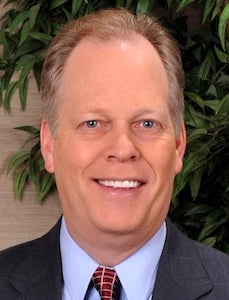
James Hunter
EXECUTIVE VICE PRESIDENT AND GENERAL COUNSEL
MARRIOTT VACATIONS
WORLDWIDE CORPORATION
As executive vice president and general counsel at Marriott Vacations Worldwide, what does your typical day look like?
No two days look alike, which is one thing that makes this a fascinating company and industry to be a part of. I spend about a third of my time with the public company aspects of my role, which typically involve interacting with board members and our CEO, CFO, and other executive officers. I then split the balance of my time among development, sales, marketing, operations, and related disciplines of our vacation ownership business.
Since our operations span the globe, I tend to focus on matters that require real-time interaction with overseas team members during their working hours. That means connecting with Asia Pacific in the early morning or evening, Europe in the afternoon, and the Americas throughout my work day.
We constantly develop new resorts, products, and programs, so a lot of time is spent working through issues to support growth and innovation. The legal landscape is also constantly changing, so a fair amount of effort is spent tracking and assessing implications of new laws and regulations, and helping our business leaders frame game plans to anticipate or react.
We have a terrific team of professionals, and they are highly engaged in the business. To help them maximize their impact, I encourage our team members to continue to evolve our processes and create tools — such as checklists, training programs, and templates — to make our work more effective and efficient.
What brought you to in-house practice, and in turn to Marriott?
Prior to moving in-house, I was engaged in a corporate and commercial practice at a law firm in Washington, DC. I liked transactional work — especially international work — and was happy to stay with the firm. After several calls from a recruiter about other law firm jobs, I told him that I wasn’t interested in moving to another firm. However, if he had an in-house opportunity with a highly respected and well-known company that involved international transactional work, I would be interested in the prospect. Two years later, he called me back and said, “I think I’ve got it.” “It” was an in-house position with Marriott International to work on the overseas expansion of its hotel business. For my areas of interest and experience, it was the perfect opportunity. I’ve really enjoyed all aspects of my initial and subsequent roles with Marriott International and Marriott Vacations — challenging legal work, a fascinating industry, and top-notch legal and business colleagues.
As senior counsel of a multinational company, what challenges currently “keep you up at night” and how do you go about addressing them?
I tend to think about many of the same issues that senior business people think about — the local and global economies, the ability of people to travel freely, the ability to conduct business globally, the implications of e-commerce, and the information and social media age — albeit from a legal perspective. My goal is to try to anticipate trends and guide the company to be as prepared as reasonably possible.
As a growing company, we continue to explore opportunities in other parts of the world, many of which embrace legal traditions and cultures that can be vastly different from one another. We need to be agile and adept at learning and adapting to these environments, and careful to suspend any assumptions we might bring with us, as many of our assumptions may prove to be invalid.
We also continue to innovate our products and processes, which requires a fair amount of creativity and collaboration among our legal team and the rest of the company. One constant challenge is the need to evaluate complex innovation efforts carefully, while doing so expeditiously in order to achieve speed to market. The depth of experience of our in-house legal team coupled with our stable of “go to” outside law firms who know us well put us in a good position to rise to the challenge.
How involved are you with your local chapter, and how has your interaction with the chapter and membership with ACC helped you in your career?
Our department is very involved in the Central Florida ACC Chapter. We provide an ACC membership for each lawyer in our department and encourage active participation, which I believe has helped foster professional development, continuing education, peer networking, and leadership for our team. For example, several members of our team have had leadership roles with our local ACC chapter — in fact, one of our team members currently serves as president. Our team members are frequent participants in the CLE seminars that ACC organizes. We also assist in planning CLE sessions and serving as CLE panelists.
Your ACC membership has aided others, through participation in the Street Law program. Can you tell us a bit about the program and why it’s important for you and your legal department to be involved?
I am a huge fan of Street Law and am extremely grateful for ACC’s support. For over 10 years, our law department has participated in the Street Law Corporate Diversity Pipeline program, which tackles the lack of diversity in the legal profession by focusing on strategies to encourage students of color to enter the legal profession. The program provides students with role models, connections with legal professionals, and opportunities to experience the types of work lawyers do. It broadens their impressions of the legal profession and fuels their interest in legal careers. The program has grown significantly over the last decade, and now involves over 50 well-known companies that team up with local high schools across the country.
We partner with Oak Ridge High School in Orlando, Florida, which has one of the more diverse student populations in Central Florida. Our version of the program sets out to achieve Street Law’s objectives through three primary components: (1) in-classroom teaching by members of our department of legal topics to high school students; (2) annual workshop conferences held at our corporate headquarters where high school students have opportunities to hold mock negotiations and debates; and (3) an annual summer internship program, which is somewhat unique to our version of the Street Law Program.
Under our internship program, we offer employment to two high school students for the summer to work in our department. The experience offers them a glimpse of what it is like to work in a corporate setting and legal department. The interns tackle meaningful work assignments and are offered an opportunity to learn about our department, our company, our resorts, and our industry. They shadow our lawyers and participate in team meetings. They also are introduced to law firms who represent our company and participate in outings for behind-the-scenes tours of local resorts and courts, including meeting with a state court judge.
Personnel from all levels of our — lawyers, paralegals, and legal secretaries — lead the program, and the level of participation is extraordinary. Our Street Law program is impactful in two fundamental ways. It enriches the students and can be a life changer for them. It also enriches our team members, who thrive on the “spirit to serve” culture championed by our company.

How can other members get involved in the Street Law program?
Street Law offers a number of programs in which lawyers and legal professionals both in-house and at law firms can participate. More information about these programs and how to get involved is available here. The extraordinary staff at Street Law are happy to help match people up with opportunities to get involved.
Speaking of future in-house lawyers, what are some skills the next generation of in-house counsel need to acquire to be successful?
A key difference between outside counsel and in-house counsel is the amount of exposure our legal professionals have to our business colleagues. In order to be effective, it is important that we understand the business, the goals and objectives of our business clients, and the language they speak. We need to be able to convey our advice in a useful, understandable, and actionable way.
Success in the future will also require an ability to adapt to change readily and frequently, and anticipate changes that may occur in the future. It’s interesting to go back and review legal advice that was framed decades ago to see how stale and irrelevant it can become in the current era. With business disruptors emerging across a wide array of industries, “evolve or die” is a relevant adage for everyone, including lawyers.
How does the Central Florida Chapter, as well as ACC in general, promote meaningful connections and provide value? What is the most useful aspect of your ACC membership?
ACC offers many compelling benefits. I particularly like the CLE opportunities that ACC facilitates, including seminars (usually located conveniently nearby), webinars, and other offerings. I have found these programs to be essential from an in-house perspective. ACC also affords many opportunities to connect with other in-house counsel, both locally and nationally, whether at ACC conferences, CLE sessions, or other gatherings, which is great for networking and establishing relationships with peers at other companies. The resources available on the ACC website are also quite valuable and time-saving, such as the comprehensive and informative InfoPAKs. Another ACC program we have found particularly relevant is the in-house legal ethics training program.
What advice do you have for new in-house counsel, or those looking to move in-house?
If you are a lawyer who is looking to move in-house, I would encourage you to learn as much as you can about the business of your clients and take advantage of opportunities to build professional relationships with them. These relationships are frequently the source of in-house opportunities down the road, and the more you know about your client’s business, the more likely your client is to be interested in considering you for an in-house position when one is available.
If you are new to in-house counsel, I would encourage you to develop strong relationships with your clients so that you can learn as much about their goals and objectives as you can. You should seek to establish a routine of regular interaction. This will allow you stay up to speed with their evolving priorities, get early insight into new projects or initiatives, and provide insight on how you might be able to assist. Let them know that you are there to solve problems and find solutions to achieve their goals. The more you can speak their language, the better they will understand your guidance and advice.




